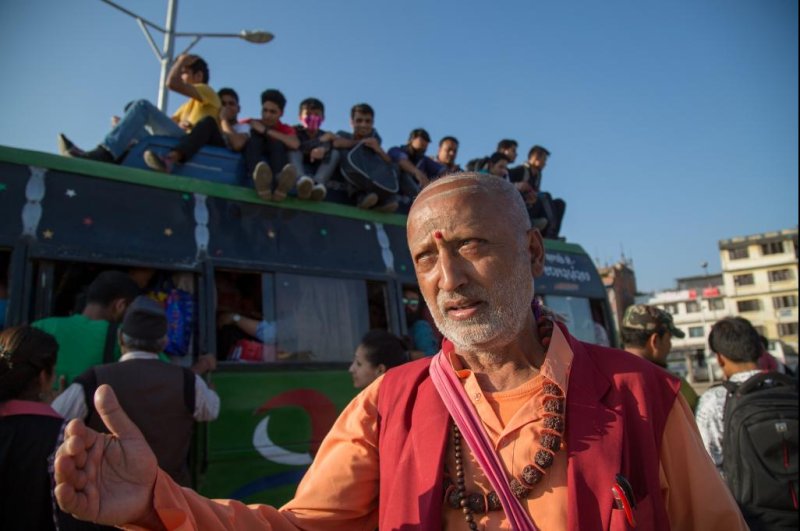1 of 5 | Damodar Gautam is among those who blames the gas shortage on India. Photo by David Caprara/UPI
KATHMANDU, Nepal, Oct. 19 (UPI) -- A three-week blockade along Nepal's border with India has created a fuel shortage that has shut down gas stations and burdened public transportation resources.
Nepal blames India for the obstructions blocking deliveries; India blames protesters on the Nepal side by Madhesi ethnic groups who feel they are underrepresented in Nepal's new constitution, which passed Sept. 20.
India's Ministry of External Affairs spokesman Vikas Swarup said recently thousands of trucks were waiting to enter Nepal, but Madhesi protests were blocking several entry points,
"There is no blockade by India on Nepal, either official or unofficial," he said. "Nepal has to set its house in order and has to reach out to its own people in a spirit of reconciliation."
On Sunday, the Indian Express reported that 300 fuel trucks were allowed to enter Nepal in a more peaceful area. The fuel shortage has left many gas stations empty, with commuters crowding the roofs of any operational buses to get around.
The tensions center around the Madhesi, who inhabit the Terai strip flatlands in Nepal that run along the Indian border. Madhesis say they have faced ethnic discrimination by the hill ruling classes of Nepal since their incorporation into the country by trade agreements with the British Empire in 1816 and 1860. Nepal's new constitution, they say, is a continuation of this discrimination and marginalization.
"Madhesis are nowhere in the state structure," says Madhesi parliamentarian Ameres Kumar Singh. "They are rarely found in army, rarely found in security forces, police and armed police forces, you will hardly find [them] in judiciary, and you will rarely find [them in] the educated level of the politics in government office."
People of the Terai plains comprise over half of Nepal's population, according to census data, and the Terai produces over 45 percent of Nepal's GDP, according to figures from the United Nations' 2014 Human Development Report.
Vijay Kant Karna, a Madhesi professor of political science at Kathmandu's Tribhuvan University and former ambassador to Scandinavia and Finland, said less than 15 percent of national funds are allocated to the Terai for development, and Madhesis occupy less than 10 percent of positions in all sectors of the government and police forces.
Many Madheshis feel that blaming India for the blockade is an attempt to continue to sideline their concerns. Over 35,000 Madhesi protesters have staged a sit-in at the border checkpoint in Birgunj town, 55 miles south of the capital of Kathmandu.
"When the block ends is up to [the] Nepal government," said Mohammad Riyaj Safi, a Madhesi who has been taking part at protests at the border checkpoint in the town of Jathi. "They killed us and treat us like animals, so now we are stopping the country and demanding rights."
Over 40 protesters have been killed by Nepali police during the weeks surrounding the passing of the constitution. Some fear that a failure to address Madhesi concerns could spur on groups calling for a separate state. Many Madhesis, however, view this as a last resort.
"We want to live in this country with full dignity, with equal rights––with social justice," Karna said. "If such a suppression continues," he said, there "may be [a] separatist movement, which is what some of the political parties are asking... if the suppression continues then they might demand for the independent countries, which we don't want actually."















